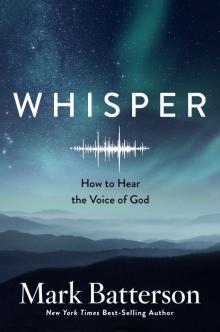- Home
- Mark Batterson
Whisper
Whisper Read online
Praise for
Whisper
“Few authors capture the imagination with the written word like Mark Batterson. His personal stories and biblical convictions will lead you to new places as you are encouraged to lean into and listen for the voice of God day after day. Open your heart, but more importantly open your ears and discover afresh the whisper of a God who still longs to speak to His people.”
—BRIAN HOUSTON, founder and global senior pastor of Hillsong Church
“If you’ve ever longed to hear the voice of God, this book is an essential guide. I’ve been deeply blessed by the personal and prescriptive words of Mark Batterson in Whisper. Packed full of practical steps and godly wisdom, Whisper is one of those books you won’t be able to put down. It will open your eyes and your ears to God in a new way.”
—CHRISTINE CAINE, founder of Propel Women and author of Unashamed
“Some of the most frequent questions I get as a pastor have to do with hearing from God. In Whisper, Mark Batterson cuts through the confusion and shows the way to a deeper and closer relationship with God—one that leaves us guessing less and discerning more.”
—STEVEN FURTICK, pastor of Elevation Church and New York Times best-selling author
“Not a day passes that I don’t ask, ‘Lord, what should I do?’ I need His counsel and crave His guidance. For that reason I welcome this book. May God use it to attune my heart to His.”
—MAX LUCADO, pastor and author
WHISPER
All Scripture quotations, unless otherwise indicated, are taken from the Holy Bible, New International Version®, NIV®. Copyright © 1973, 1978, 1984, 2011 by Biblica Inc.® Used by permission. All rights reserved worldwide. Scripture quotations marked (ESV) are taken from the Holy Bible, English Standard Version, ESV®) Text Edition® (2016), copyright © 2001 by Crossway Bibles, a publishing ministry of Good News Publishers. All rights reserved. Scripture quotations marked (HCSB) are taken from the Holman Christian Standard Bible®, copyright © 1999, 2000, 2002, 2003, 2009 by Holman Bible Publishers. Used by permission. HCSB® is a federally registered trademark of Holman Bible Publishers. Scripture quotations marked (KJV) are taken from the King James Version. Scripture quotations marked (TLB) are taken from The Living Bible copyright © 1971. Used by permission of Tyndale House Publishers Inc., Carol Stream, Illinois 60188. All rights reserved. Scripture quotations marked (MSG) are taken from The Message. Copyright © by Eugene H. Peterson 1993, 1994, 1995, 1996, 2000, 2001, 2002. Used by permission of NavPress. All rights reserved. Represented by Tyndale House Publishers Inc. Scripture quotations marked (NASB) are taken from the New American Standard Bible®. Copyright © 1960, 1962, 1963, 1968, 1971, 1972, 1973, 1975, 1977, 1995 by the Lockman Foundation. Used by permission. (www.Lockman.org). Scripture quotations marked (NKJV) are taken from the New King James Version®. Copyright © 1982 by Thomas Nelson Inc. Used by permission. All rights reserved. Scripture quotations marked (NLT) are taken from the Holy Bible, New Living Translation, copyright © 1996, 2004, 2007, 2013, 2015 by Tyndale House Foundation. Used by permission of Tyndale House Publishers Inc., Carol Stream, Illinois 60188. All rights reserved.
Italics in Scripture quotations reflect the author’s added emphasis.
Details in some anecdotes and stories have been changed to protect the identities of the persons involved.
Hardcover ISBN 9780735291089
Ebook ISBN 9780735291096
Copyright © 2017 by Mark Batterson
Cover design by Mark D. Ford
All rights reserved. No part of this book may be reproduced or transmitted in any form or by any means, electronic or mechanical, including photocopying and recording, or by any information storage and retrieval system, without permission in writing from the publisher.
Published in the United States by Multnomah, an imprint of the Crown Publishing Group, a division of Penguin Random House LLC, New York.
MULTNOMAH® and its mountain colophon are registered trademarks of Penguin Random House LLC.
Library of Congress Cataloging-in-Publication Data
Names: Batterson, Mark, author.
Title: Whisper : how to hear the voice of God / Mark Batterson.
Description: First Edition. | Colorado Springs : Multnomah, 2017.
Identifiers: LCCN 2017028952 | ISBN 9780735291089 (hardcover) | ISBN 9780735291096 (electronic)
Subjects: LCSH: Listening—Religious aspects—Christianity. | Spirituality—Christianity. | God (Christianity)
Classification: LCC BV4647.L56 B38 2017 | DDC 248—dc23
LC record available at https://lccn.loc.gov/2017028952
v4.1_r1
a
Dedicated to Paul McGarvey, a mentor in ministry. You prayed a prayer in August of 1984 that God answered on July 2, 2016.
Contents
Cover
Title Page
Copyright
Dedication
Prologue: The Tomatis Effect
PART ONE: THE POWER OF A WHISPER
1 The Bravest Prayer
2 The Voice
3 The Whispering Spot
PART TWO: THE SEVEN LOVE LANGUAGES
4 Sign Language
5 The Key of Keys—Scripture
6 The Voice of Gladness—Desires
7 The Door to Bithynia—Doors
8 Dreamers by Day—Dreams
9 Hidden Figures—People
10 The Archer’s Paradox—Promptings
11 Joystick—Pain
Epilogue: The Whisper Test
Notes
THE TOMATIS EFFECT
Speak, LORD, for your servant is listening.
—1 SAMUEL 3:9
More than half a century ago, Dr. Alfred Tomatis was confronted with the most curious case of his fifty-year career as an otolaryngologist. A renowned opera singer had mysteriously lost his ability to hit certain notes even though those notes were well within his vocal range. He had been to other ear, nose, and throat specialists, all of whom thought it was a vocal problem. Dr. Tomatis thought otherwise.
Using a sonometer, Dr. Tomatis discovered that even an average opera singer produces 140-decibel sound waves at a meter’s distance.1 That’s slightly louder than a military jet taking off from an aircraft carrier. And the sound is even louder inside one’s skull. That discovery led to a diagnosis: the opera singer had been deafened by the sound of his own voice. Selective muteness was caused by selective deafness. If you can’t hear a note, you can’t sing that note. In Dr. Tomatis’s words, “The voice can only reproduce what the ear can hear.”2
The French Academy of Medicine dubbed it the Tomatis effect.
I’m guessing you, like me, have your fair share of problems. And your problem-solving techniques might be as effective as mine, which isn’t very. Maybe that’s because we’re treating symptoms while ignoring the root cause: a spiritual Tomatis effect. Is it possible that what we perceive to be relational, emotional, and spiritual problems are actually hearing problems—ears that have been deafened to the voice of God? And it’s that inability to hear His voice that causes us to lose our voice and lose our way.
Let me make a bold statement at the beginning of this book: Learning how to hear the voice of God is the solution to a thousand problems! It’s also the key to discovering our destiny and fulfilling our potential.
His voice is love.
His voice is power.
His voice is healing.
His voice is wisdom.
His voice is joy.
If your life is off-key, maybe it’s because you’ve been deafened by
the negative self-talk that doesn’t let God get a Word in edgewise! Maybe you’ve listened to the voice of criticism so long you can’t believe anything else about yourself. Or maybe it’s the Enemy’s voice of condemnation that speaks lies about who you really are. If you don’t silence those competing voices, they’ll eventually deafen you. You won’t be able to sing God’s song because you won’t be able to hear His voice.
Is God’s voice the loudest voice in your life?
That’s the question.
If the answer is no, that’s the problem.
We live in a culture where everyone wants to have his or her voice heard but has so little to say. And that’s because we do so little listening, especially to God. The best way to get people to listen to us is for us to listen to God. Why? Because we’ll have something to say that is worth hearing.
Ultimately, all of us need to find our voice. And by voice I mean the unique message God wants to speak through our lives. But finding our voice starts with hearing His voice.
Would you be willing to pray a bold prayer at the beginning of this book? It’s an ancient prayer. It’s a prayer that can change the trajectory of your life, just as it did for a prophet named Samuel. Before you pray it, let me issue one warning. If you aren’t willing to listen to everything God has to say, you eventually won’t hear anything He has to say. If you want to hear His comforting voice, you have to listen to His convicting voice. And it’s often what we want to hear least that we need to hear most. Trust me, though, you want to hear what He has to say.
Are you ready?
Here’s the seven-word prayer that can change your life:
Speak, LORD, for your servant is listening.3
That prayer is easier said than done, no doubt. But if you meant what you just prayed, your life is about to change for the better.
THE POWER OF A WHISPER
THE BRAVEST PRAYER
After the fire came a gentle whisper.
—1 KINGS 19:12
On the morning of August 27, 1883, ranchers in Alice Springs, Australia, heard what sounded like gunshots.1 The same mysterious sound was reported in fifty geographical locations spanning one-thirteenth of the globe. What those Aussies heard was the eruption of a volcano on the remote Indonesian island of Krakatoa 2,233 miles away!
That volcanic eruption, possibly the loudest sound ever measured, was so loud that the 310-decibel sound waves circumnavigated the globe at least four times. It generated three-thousand-foot tidal waves, threw rocks a distance of thirty-four miles, and cracked one-foot-thick concrete three hundred miles away!2
If you were to drill a hole directly through the center of the earth, opposite of Krakatoa you would find Colombia, South America. Although the sound of the eruption wasn’t audible in Colombia, there was a measurable spike in atmospheric pressure because of infrasonic sound waves that caused the air to tense. The sound may not have been heard, but it was felt, all the way around the world. According to science journalist and New York Times columnist Maggie Koerth-Baker, “Just because you can’t hear a sound doesn’t mean it isn’t there.”3
At low levels sound is imperceptible.
At high levels it’s unignorable.
If sound exceeds 110 decibels, we experience a change in blood pressure. At 141 decibels we become nauseous. At 145 decibels our vision blurs because our eyeballs vibrate. At 195 decibels our eardrums are in danger of rupturing. And death by sound waves can happen at 202 decibels.4
The act of hearing is detecting vibrations of the eardrum caused by sound waves, and the intensity of those waves is measured in decibels. On one end of the sound spectrum is the sperm whale, the loudest animal on earth. The clicking noise it uses to echolocate can hit 200 decibels. Even more impressive, researchers believe that whale songs may travel up to ten thousand miles underwater!5 Next to the sperm whale is jet engines (150 decibels), air horns (129 decibels), thunderclaps (120 decibels), and jackhammers (100 decibels).6
What’s on the other end of the sound spectrum?
A whisper, measuring just 15 decibels.
Technically speaking, our absolute threshold of hearing is 0 decibels. That corresponds to a sound wave measuring 0.0000002 pascals, which causes the eardrum to vibrate by just 10¯8 millimeters. That’s less than a billionth of the ambient pressure in the air around us and smaller than the diameter of a hydrogen atom!7
Juxtapose that with this:
Then a great and powerful wind tore the mountains apart and shattered the rocks before the LORD, but the LORD was not in the wind. After the wind there was an earthquake, but the LORD was not in the earthquake. After the earthquake came a fire, but the LORD was not in the fire. And after the fire came a gentle whisper.8
The ESV calls it “a low whisper.”
The NASB calls it “a gentle blowing.”
The KJV calls it “a still small voice.”
We tend to dismiss as insignificant the natural phenomena that preceded the whisper because God was not in them, but I bet they got Elijah’s attention. God has an outside voice, and He’s not afraid to use it. But when God wants to be heard, when what He has to say is too important to miss, He often speaks in a whisper just above the absolute threshold of hearing.
The question, of course, is why.
And how.
And when and where.
Those are the questions we’ll explore and seek to answer in the pages that follow.
The Sound of Silence
The Hebrew word for “whisper,” demamah, can be translated “silence” or “stillness” or “calmness.”9 Simon and Garfunkel weren’t far off with the title of their 1964 hit single, “The Sound of Silence.” The same Hebrew word is used to describe the way God delivers us from our distress: “He stilled the storm to a whisper; the waves of the sea were hushed.”10 And that psalm foreshadows the way Jesus would stop a storm in its tracks with three words: “Quiet! Be still!”11
His whisper is gentle, but nothing is more powerful.
My dictionary defines whisper as “speaking very softly using one’s breath without one’s vocal cords.” The use of breath instead of vocal cords is significant. Isn’t that how God created Adam? He whispered into the dust and named it Adam.
Adam was once a whisper.
So were you.
So was everything else.
Whispering is typically employed for the sake of secrecy. No form of communication is more intimate. And it seems to be God’s preferred method.12 The question again is why. And I won’t keep you guessing any longer.
When someone speaks in a whisper, you have to get very close to hear. In fact, you have to put your ear near the person’s mouth. We lean toward a whisper, and that’s what God wants. The goal of hearing the heavenly Father’s voice isn’t just hearing His voice; it’s intimacy with Him. That’s why He speaks in a whisper. He wants to be as close to us as is divinely possible! He loves us, likes us, that much.
When our children were young, I would occasionally play a little trick on them. I’d speak in a whisper so they would inch closer to me. That’s when I’d grab them and hug them. God plays the same trick on us. We want to hear what He has to say, but He wants us to know how much He loves us.
“The voice of the Spirit is as gentle as a zephyr,” said Oswald Chambers. “So gentle that unless you are living in perfect communion with God, you never hear it.”13 Aren’t you grateful for a gentle God? The Almighty could intimidate us with His outside voice, but He woos us with a whisper. And His whisper is the very breath of life.
Chambers continued, “The checks of the Spirit come in the most extraordinarily gentle ways, and if you are not sensitive enough to detect His voice you will quench it, and your personal spiritual life will be impaired. His checks always come as a still small voice, so small that no one but the saint notices them.”14
Once a Whisper
&nb
sp; For the past two decades, I’ve had the joy and privilege of pastoring National Community Church in Washington, DC, and I wouldn’t want to be anyplace else doing anything else with anyone else. I’m living the dream, but that dream was once a whisper.
The genesis of the dream goes all the way back to a cow pasture in Alexandria, Minnesota, where I heard the still small voice of God. I had just finished my freshman year at the University of Chicago, where I was a PERL (politics, economics, rhetoric, and law) major. Law school was Plan A, but that was before I asked God a dangerous question: What do You want me to do with my life? Of course, it’s far more dangerous not to ask Him that question!
In retrospect I’ve dubbed that summer between my freshman and sophomore years of college my “summer of seeking.” For the first time in my life, I got serious about getting up early in the morning to pray. And it wasn’t just a religious ritual. I was desperate to hear His voice, and maybe that’s why I finally did.
At the end of the summer, our family was vacationing at Lake Ida in Alexandria, Minnesota. I decided to do a long prayer walk down some dirt roads. For some reason walking helps my talking. I’m able to pray with more focus and listen with less distraction. At one point I went off road through a cow pasture. As I meandered my way around cow patties, I heard what I would describe as the inaudible yet unmistakable voice of God. In that moment at that place, I knew that God was calling me into full-time ministry. It wasn’t words as much as it was a feeling, a sense of calling. And that one whisper prompted me to give up a full-ride scholarship at the University of Chicago and transfer to Central Bible College in Springfield, Missouri. That move made no academic sense whatsoever and was second-guessed by more than a few people in my life, but that’s often the way His whisper works.
Those who dance are thought mad by those who hear not the music.
That old adage is certainly true of those who walk to the beat of God’s drum. When you take your cues from the Holy Spirit, you’ll do some things that will make people think you’re crazy. So be it. Obey the whisper and see what God does.

 Jack Staples and the Ring of Time
Jack Staples and the Ring of Time Jack Staples and the City of Shadows
Jack Staples and the City of Shadows Jack Staples and the Poet's Storm
Jack Staples and the Poet's Storm Whisper
Whisper The Circle Maker_Praying Circles Around Your Biggest Dreams and Greatest Fears
The Circle Maker_Praying Circles Around Your Biggest Dreams and Greatest Fears